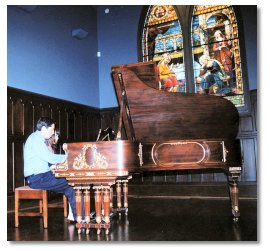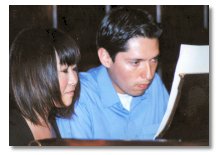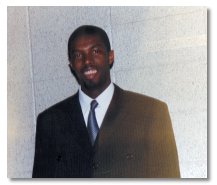Graduation 2002: As good as it gets
Graduation, which punctuates the ELI calendar every two months, provided some memorable firsts this year.
The first time a valedictorian ever sang during her speech, when A-Young Kim from Korea performed an original version of "Hey Jude," urging her classmates to "let the world under your skin and make it better."
The first post-graduation piano concert, featuring Alvaro Puig from Colombia, Kotone Arai from Japan and Seung-hun Lee from Korea, who performed in Bayard Sharp Hall, the university's newest recital hall.
 |
| The June graduation featured a piano duet by Alvaro Puig (Colombia) and Kotone Arai (Japan) in Bayard Sharp Hall |
And the youngest-ever valedictorian, 17-year-old Paisid Aramphongphan from Thailand, who quoted his favorite movie, "As Good As It Gets," when he advised his fellow students, "Always look on the bright side of life."
"It is all about attitude," he told the audience, attributing his improvement in English to his own positive attitude.
"No matter how impossible your goal may seem," he said, "always, always believe in yourselves, that you can do it. And, one day, I'm sure you will."
The following profiles of graduates in 2002 illustrate the diversity of goals ELI students bring to their studies - and the tenacity with which they pursue them.
Alvaro Puig, Colombia
Studying at ELI brought a number of surprises to Alvaro Puig. When the
24-year-old Colombian arrived at his dorm room in Christiana Towers in
March, he was startled to find the door opened by his future roommate,
a student from Japan wearing dreadlocks.
"I thought I had arrived on a different planet," he said, laughing.
Puig has since made friends with ELI students from many countries - something he hadn't expected. But then, Puig hadn't really expected to come to ELI in the first place. Three months earlier the medical doctor had been working in Sasaima, an hour and a half outside Bogota, completing a year of national service. One day guerrilla forces asked the mayor of the town to "borrow" Puig to take care of their wounded - for an unspecified amount of time. It was a decisive moment.
"It was too risky," he said. "Maybe it would be a week, maybe a year or more."
Puig quit his job and returned to Bogota. He decided to try to study in the United States and managed to submit his application to Colfuturo, an agency which places Colombian students in U.S. schools, on the day before the deadline.
In addition to the English instruction he received at ELI to prepare for postdoctoral medical studies, Puig is pleased by the other lessons his stay has provided.
"I came here to learn English, but this has been one of the best experiences of my life. I have met a lot of people from different cultures and I realize that they are similar to me in some aspect of their lives."
One area of commonality which Puig shared was music. An accomplished pianist and a winner of a national competition in Colombia, Puig wasted no time contacting the Music Department at the University of Delaware. He met piano teachers Christine Delbeau and Julie Nishimura and audited a music appreciation class taught by former department chair Dr. Larry Peterson. Puig even accepted Peterson's offer to perform traditional Colombian "bambuco" music for the class.
 |
|
Kotone Arai and Alfredo Puig
|
Puig also shared his love of the piano with his best friend at ELI, Kotone Arai from Japan.
"I said, 'Let's make a deal. I'm going to learn Japanese music, but you have to learn Colombian.'"
The pair practiced almost every day on the piano in Christiana Commons and crowned their friendship at ELI's June graduation, performing a duet of Japanese and Colombian music in Bayard Sharp Hall.
Mohamed Camara, Guinea
 |
|
Mohamed Camara
|
In 1958, Guinea became the first African nation to declare its independence from France. President Sekou Touré also rejected economic ties with the former colonizer, declaring,
"We prefer poverty in freedom over prosperity in slavery."
Mohamed Camara, 34, recites those historic words in French, one of five languages he speaks in addition to English.
Twenty-three years after Guinea's political independence, Camara came to the United States and to ELI with the goal of helping his country climb out of poverty and achieve economic independence as well.
He wants to open the first bauxite smelting plant in Guinea - which holds two-thirds of the world's bauxite reserves - to process the raw product used to produce aluminum. Camara studied economics at the University of Conakry and got his master's in statistics from the University of Statistics and Computer Science in Moscow. After working several years as a mining company manager in Guinea, he competed with 150 candidates for a scholarship to study for an MBA in the United States.
After six months in Newark, Camara seemed pleased with his progress in English. "Now I can watch TV and understand. I can even understand African-Americans when they talk to me," he said. "That was particularly tough."
Camara joined the Concord School of Management (formerly known as Arthur D. Little School of Management) in September.
 |
|
Alfredo Avila
|
Alfredo Avila, Mexico
When Alfredo Avila chose digital video editing as his topic for a class
presentation at ELI, he'd already won a prize for a short video production
in his native Mexico. Film is one of Avila's passions, but his work will
probably never reach a multiplex cinema near anyone reading this.
Instead, Avila, who is preparing for the priesthood, hopes to use his videos in church to reach the audience he came to the United States to serve - Mexican immigrants.
Since starting his studies nine years ago at the Guadalajara Seminary in Mexico, Avila, 24, has set his sights on missionary work. When a representative of the Wilmington Catholic diocese visited the seminary in 2001, Avila accepted his first mission - at St. Catherine of Siena Church on Centreville Road near Prices Corner in Wilmington. Upon arriving in September 2001, Avila began serving the more than 6,000 Mexican parishioners in the area, working with youth groups and advising adults on a variety of issues.
"The most challenging thing has been legal problems," he said, "especially after September 11. Increased restrictions make deportation a real threat," he said.
"We try to give advice and help people find jobs." Since graduating from ELI in August, Avila has begun a two-year program in psychology at St. Mary's Seminary in Baltimore, with the aim of returning to the Wilmington diocese as a psychiatric consultant.
"We are trying to help the Mexican population live with dignity and contribute to society here."